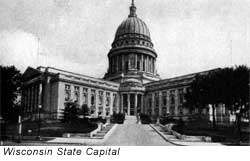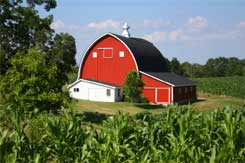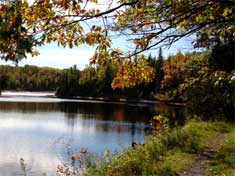
Wisconsin is known for its pioneering reform movements. A meeting held in Ripon in 1854 was important to the founding of the Republican Party. The politically powerful La Follette family led the Progressive reform movement in the state in the early 1900s.
 Wisconsin was also a pioneer in direct primary elections, the regulation of public utilities and railroads, teachers' pensions, and minimum-wage laws. It was the first state to have unemployment insurance and worker's compensation. Wisconsin was the first state to mark their highways with numbers and the first state to pass a law requiring safety belts in all new cars bought there. The first state income tax was established in Wisconsin. Wisconsin was the first state to abolish the death penalty for convicted criminals. Wisconsin was also a pioneer in direct primary elections, the regulation of public utilities and railroads, teachers' pensions, and minimum-wage laws. It was the first state to have unemployment insurance and worker's compensation. Wisconsin was the first state to mark their highways with numbers and the first state to pass a law requiring safety belts in all new cars bought there. The first state income tax was established in Wisconsin. Wisconsin was the first state to abolish the death penalty for convicted criminals.
Many innovations in education occurred in Wisconsin. The state had the first kindergarten in the United States, the first school for training rural teachers, and the first vocational schools. If you want to stay home and go to college, you can, thanks in part to the University of Wisconsin. It was one of the first universities to offer correspondence courses.

Wisconsin is an East North Central state bordered by Lake Superior to the north, the Upper Peninsula of Michigan to the northeast, Lake Michigan to the east, Illinois to the south, and Minnesota and Iowa to the west. The state is located in a region that was shaped by gigantic glaciers during the Ice Age. Its landscape includes woods, lakes, rivers, streams, rolling hills, and fertile valleys.

 Wisconsin is an important agricultural state. Numerous herds of milk cows make it the leading dairy farming state in the country. In fact, the state is known as "America's Dairyland;" about 16 percent of our milk comes from Wisconsin. Oats and hay are important crops in the state because they provide food for the dairy cows. Other major farm products grown in the state are green peas, string beans, and sweet corn. Wisconsin is an important agricultural state. Numerous herds of milk cows make it the leading dairy farming state in the country. In fact, the state is known as "America's Dairyland;" about 16 percent of our milk comes from Wisconsin. Oats and hay are important crops in the state because they provide food for the dairy cows. Other major farm products grown in the state are green peas, string beans, and sweet corn.
Manufacturing is extremely important to Wisconsin. Large quantities of cheese, butter, and other dairy products are manufactured in Wisconsin, which is known as the "Cheese Capital of the Nation." It also produces canned and frozen vegetables, sausage, and beer. Oscar Mayer Foods Corporation has a large meat packing plant in Madison, the state's capital.
In addition to food products, the state produces machinery and paper products. Factories in the southeastern region of the state make construction cranes, engines, machine tools, and other machinery. The state's paper mills are located in the northern portion of the state.
Most of the people who work in Wisconsin work in service industries like education, finance, health care, and trade. The state has one of the largest public university systems in the country. Milwaukee, the state's largest city, is one of the most important financial centers in the Midwest.

 Many people vacation in Wisconsin because of its beauty and wide variety of outdoor activities. If you like to swim, fish, boat, hike, ride horses, hunt, ski, toboggan, or go iceboating, Wisconsin is the state for you. It has about 15,000 lakes, many trails through its woods, and forests and fields for hunting. See Fat Man's Misery and Devil's Elbow, interesting rock formations found in Wisconsin. Many people vacation in Wisconsin because of its beauty and wide variety of outdoor activities. If you like to swim, fish, boat, hike, ride horses, hunt, ski, toboggan, or go iceboating, Wisconsin is the state for you. It has about 15,000 lakes, many trails through its woods, and forests and fields for hunting. See Fat Man's Misery and Devil's Elbow, interesting rock formations found in Wisconsin.
Wisconsin was named for the Wisconsin River. The name for the river probably comes from a Chippewa Indian word, usually translated as "grassy place." The state is known as the "Badger State" because the state's miners dug into the hillside and lived in the holes they dug, much like badgers digging burrows. Residents of Wisconsin are known as Badgers. The abbreviation for Wisconsin is WI.
|